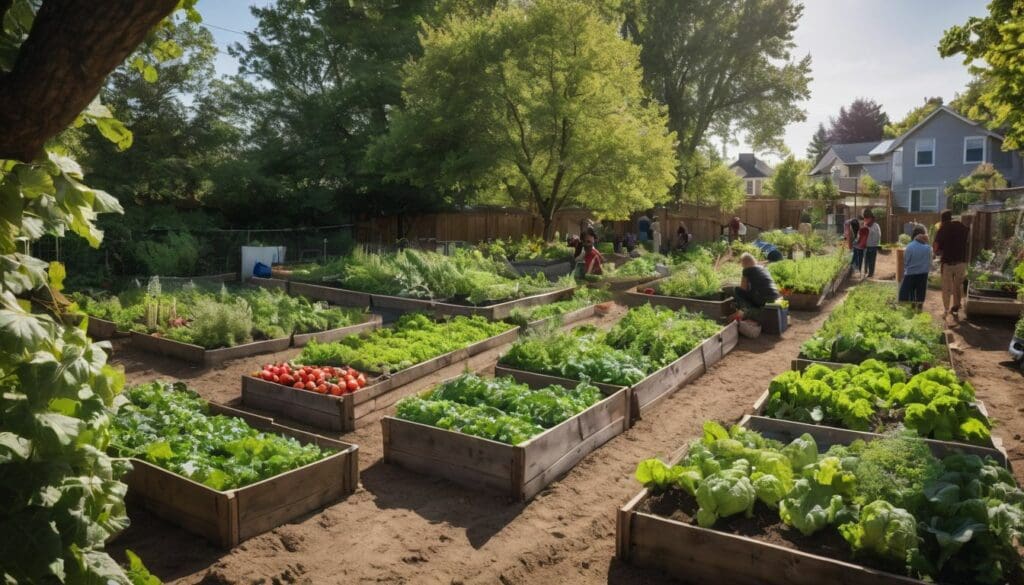In numerous corners of our green and pleasant land, the daily quest for fresh and nutritious sustenance is more than a mere inconvenience—it’s a genuine plight. Yet, amidst such trials, we’re reminded of the indomitable spirit that binds us as a community; one deeply invested in our collective well-being and rich heritage.
With sleeves rolled up and hands plunged into the soil of cooperation, this article unfolds with insights brimming with hope – guiding communities to nurture resilience through the cultivation of their own food supplies.
This isn’t just about planting seeds; it’s an odyssey towards self-sufficiency that fosters empowerment and champions sustainability. So let us embark on this journey together—towards a future where dependency bows out to enduring communal strength.
Key Takeaways
- Growing our own food enhances community health by providing access to fresh, nutritious produce and reducing dependence on processed goods.
- Reviving traditional agricultural practices helps preserve cultural identities and empowers local economies, with Indigenous communities leading in protecting their unique culinary traditions.
- Urban agriculture initiatives tackle food inequality and encourage self-sufficiency, transforming city spaces into sources of healthy food and community engagement.
- Food sovereignty faces challenges such as climate change impact on crops, insufficient government support for small-scale farming, and inequitable global food systems that affect marginalised groups.
- By prioritising local control over food production through rights – based approaches to agriculture, communities can become more resilient against future economic or environmental crises.
The Importance of Food Sovereignty
Food sovereignty is essential for the health of communities, as it allows them to have control over their food production and consumption. It also helps in restoring cultural traditions, empowering local economies, and addressing challenges brought on by pandemics.
Community Health
Cultivating our own food plays a crucial role in enhancing community health. By embracing food sovereignty, we ensure access to nutritious and fresh produce right from our backyards or local community gardens.
This not only bolsters the well-being of individuals by providing healthier meal options but also strengthens the overall immune system of the community. With homegrown fruits and vegetables, we reduce dependency on processed goods, which often contain unhealthy additives.
Supporting small-scale farming leads to consumption of seasonal foods that are ripe and full of flavor, providing more vitamins than their supermarket counterparts that have traveled many miles.
We’re taking strides towards self-sufficiency and sustainability in our diets; this approach supports natural resources protection by reducing transportation pollution—a win for both personal health and the environment.
If you’ve ever felt the satisfaction of biting into a tomato straight from your garden or sharing a meal made with ingredients you nurtured yourself, you know there’s no comparison to store-bought alternatives.
Engaging ourselves in sustainable agriculture isn’t just about good food—it’s about preserving cultural practices around culinary delights unique to different regions.
Let’s now delve into how restoring traditions is intertwined with maintaining these diverse agricultural legacies.
Restoring Traditions
Restoring traditions is an essential aspect of food sovereignty, particularly in Indigenous communities. By reviving traditional agricultural practices and culinary techniques, these communities preserve their cultural identity while promoting healthy and sustainable food systems.
Through the resurgence of indigenous food systems, communities prioritise the use of native species, localised production, and distribution methods. This not only empowers them to take greater control over their food systems but also strengthens their self-sufficiency and resilience against external influences.
Furthermore, restoring traditions through agrarian reform and small-scale farming initiatives reinforces the connection between people and land while reclaiming local and traditional food systems.
This approach challenges the dominance of global agribusiness by promoting rights-based approaches to agriculture and preserving unique culinary practices. Ultimately, restoring traditions forms a crucial part of ensuring that each community has access to nutritious foods that are culturally relevant, reflecting the essence of true food sovereignty.
Economic Empowerment and Tourism
After restoring traditions and promoting cultural preservation through food sovereignty, communities can experience economic empowerment and boost tourism. By cultivating their own healthy, fresh foods, Native households and communities are able to address issues of hunger and health, which in turn supports local economies.
Cultivating traditional crops can also attract tourists interested in experiencing indigenous agricultural practices, bringing economic opportunities to these communities.
Indigenous food sovereignty not only promotes self-sufficiency but also creates potential for agritourism, as visitors seek out unique cultural experiences centered around traditional farming and processing practices.
Pandemic Challenges
The pandemic has posed significant challenges to achieving food sovereignty. It has highlighted the vulnerability of global food chains and the need for more localised, sustainable approaches to food production.
The disruption in supply chains has made it even more difficult for communities to access healthy, locally produced foods. Additionally, the pandemic has brought attention to the existing inequities in access to land and resources for small-scale farmers and Indigenous communities, further exacerbating issues of food insecurity and economic disenfranchisement.
As a response to the pandemic challenges, many communities have been exploring innovative solutions such as urban agriculture initiatives and community gardens to enhance local food resilience.
Indigenous Food Sovereignty
Preserving traditional food systems, promoting self-sufficiency and empowering Indigenous communities are crucial for achieving food sovereignty. Read more to understand the significance of Indigenous food sovereignty in empowering communities to grow their own food.
Preserving traditional food systems
Preserving traditional food systems is crucial for maintaining cultural identity and promoting healthy, sustainable practices. Indigenous communities prioritise the use of native species and traditional farming techniques to ensure that their food systems are aligned with their cultural heritage.
By promoting self-sufficiency and localised production, these traditional food systems support the well-being of Indigenous peoples while preserving age-old traditions. Organisations dedicated to preserving Indigenous food systems play a vital role in empowering communities to take greater control over their own food sources, enabling them to uphold their cultural identity through sustainable agricultural practices.
Moving on to “Urban Agriculture and Food Sovereignty”, let’s explore how urban areas can promote community empowerment through local food production initiatives.
Promoting self-sufficiency
Promoting self-sufficiency is a crucial aspect of food sovereignty, allowing communities to take control of their own food production and reduce dependence on external sources. By promoting small-scale farming and sustainable agriculture practices, communities can cultivate diverse crops while prioritising native species and traditional farming methods.
Through self-sufficiency, individuals can reclaim the rights to define their own food systems, fostering greater autonomy in meeting local and regional food needs.
Additionally, promoting self-sufficiency empowers communities to address issues of hunger by producing their healthy and fresh foods locally. This approach also supports economic empowerment, as it reduces reliance on global agribusiness and encourages peasant-driven agriculture while preserving cultural identity and traditions related to food production.
Empowering Indigenous communities
Indigenous food sovereignty supports communities in taking greater control over their food systems by increasing traditional and healthy practices. It prioritises the use of native species, traditional farming, and processing practices, as well as localised production and distribution.
This movement aims to reclaim local and traditional food systems while challenging the dominance of global agribusiness. As a result, it is an important aspect of preserving cultural identity and promoting the well-being of Indigenous communities.
By increasing self-sufficiency through sustainable small-scale farming, Indigenous communities can address issues of hunger and health. Food sovereignty goes beyond food security by focusing on the rights of people to define their own food and agriculture systems.
Urban Agriculture and Food Sovereignty
In urban areas like Baltimore, MD, urban agriculture plays a crucial role in promoting food sovereignty by addressing food access inequality and empowering local communities. Through initiatives such as community gardens and rooftop farms, urban agriculture not only improves overall health but also promotes self-sufficiency and community empowerment.
Case study of Baltimore, MD
Urban agriculture plays a pivotal role in promoting food sovereignty, particularly in cities like Baltimore, MD. With initiatives aimed at addressing food access inequality and empowering communities, urban agriculture is making a significant impact.
Through small-scale farming and sustainable practices, residents are reclaiming their land rights and cultivating fresh, healthy produce right in the heart of the city. This not only improves overall health but also fosters economic empowerment within the community.
In Baltimore, urban agriculture is transforming vacant lots into vibrant community gardens, providing an opportunity for locals to engage in sustainable farming practices. By promoting self-sufficiency and local production, these initiatives are not only tackling issues of global hunger but also challenging the dominance of global agribusiness.
Addressing food access inequality
Urban agriculture plays a crucial role in addressing food access inequality by providing fresh and healthy produce to communities that are often underserved by traditional grocery stores.
Initiatives such as community gardens and urban farms enable residents to grow their own fruits and vegetables, reducing the reliance on expensive or inaccessible store-bought options.
This not only improves overall health but also promotes community empowerment and self-sufficiency, ultimately narrowing the gap in food access for marginalised populations.
Promoting community empowerment
Addressing food access inequality is just one step towards promoting community empowerment through food sovereignty. By supporting small-scale farming and local agriculture initiatives, communities can take control of their own food systems.
This not only improves access to fresh and healthy foods but also fosters self-sufficiency, economic autonomy, and a sense of pride in maintaining traditional practices. Additionally, rights-based approaches play a crucial role in empowering landless workers and peasant-driven agriculture efforts, reinforcing the importance of promoting community-led solutions for sustainable food production.
Improving overall health
Improving overall health is a key benefit of food sovereignty. By growing our own fresh and healthy foods, we can ensure that our diets are rich in essential nutrients, free from harmful chemicals, and support our physical well-being.
This direct access to nutritious produce contributes to reducing the risk of diet-related illnesses such as obesity, diabetes, and heart disease while promoting better overall health for ourselves and our communities.
Another significant aspect of improving overall health through food sovereignty is the opportunity to engage in physical activity through gardening and farming. The hands-on nature of tending to crops or maintaining community gardens provides valuable exercise while nurturing mental well-being by connecting us with nature.
Challenges to Achieving Food Sovereignty
Inequitable food systems, lack of government support, and the impact of climate change are significant challenges to achieving food sovereignty. To learn more about how communities can overcome these challenges and empower themselves through growing their own food, read the full blog post.
Inequitable food systems
Inequitable food systems perpetuate disparities in access to fresh, healthy foods, disproportionately affecting marginalised communities. These systems result in limited options for nutritious food and higher rates of diet-related diseases among vulnerable populations.
Our efforts towards food sovereignty aim to address these inequities by prioritising local and regional food needs over international trade, ensuring that everyone has the right to define their own agriculture and food systems.
By challenging the dominance of global agribusiness and promoting small-scale farming, we can strive towards a more equitable distribution of resources and empower communities to reclaim control over their own sustenance.
Promoting rights-based approaches through food sovereignty is crucial for tackling systemic inequalities that contribute to inadequate access to nourishing diets. It involves reshaping the current landscape of agricultural production and distribution on a local scale, creating pathways for community empowerment and self-sufficiency.
Lack of government support
Governments often fail to provide adequate support for small-scale farming and food sovereignty initiatives. This lack of support hinders the growth of community-driven agriculture, restricting access to resources needed for self-sufficiency.
Additionally, insufficient government backing limits investment in local agricultural systems, impacting the ability of communities to address health and economic challenges through food production.
Climate change exacerbates the issue as governments may not prioritise sustainable agricultural practices or take effective action to mitigate its effects on food sovereignty. The absence of policies that protect traditional farming methods further marginalises indigenous communities striving for self-sufficiency and cultural preservation.
Climate change
Climate change poses a significant threat to food sovereignty, affecting the ability of communities to grow their own food. Rising temperatures, extreme weather events, and shifting precipitation patterns have a direct impact on agricultural production, leading to decreased crop yields and loss of traditional farming practices.
Indigenous communities, in particular, face challenges as climate change disrupts their local ecosystems and native species that are vital to their food systems. Adapting to these changes requires innovative solutions and sustainable agricultural practices that can withstand the effects of climate change.
Furthermore, climate change exacerbates existing inequalities in access to resources such as land and water for small-scale farming. As global temperatures continue to rise, it is essential for communities advocating for food sovereignty to address the underlying issues contributing to climate change while promoting resilient agricultural systems that can adapt and mitigate its impacts.
Conclusion
In conclusion, food sovereignty empowers communities to take control of their food systems. It promotes self-sufficiency and traditional farming practices. Supporting food sovereignty means supporting community empowerment and sustainable agricultural practices.
Achieving food sovereignty requires addressing inequitable food systems, government support, and the impact of climate change on agriculture. This movement is crucial for preserving cultural identity and promoting the well-being of all communities.
FAQs
1. What is food sovereignty?
Food sovereignty is about giving communities the power to grow their own food through small-scale farming, promoting self-sufficiency and rights-based approaches to agriculture.
2. How does food sovereignty benefit a community?
By focusing on peasant-driven agriculture, communities can create sustainable systems where they control what crops they grow and how they grow them, leading to better health and independence.
3. Can anyone practice food sovereignty?
Yes! Food sovereignty encourages people everywhere to learn about and engage in growing their own food according to local needs and without relying solely on large-scale commercial farms.
4. Why are rights-based approaches important in food sovereignty?
Rights-based approaches ensure that everyone has access to land, seeds, water, and other resources necessary for growing food — this way all individuals within a community have the ability to support themselves and contribute positively towards their shared well-being.





